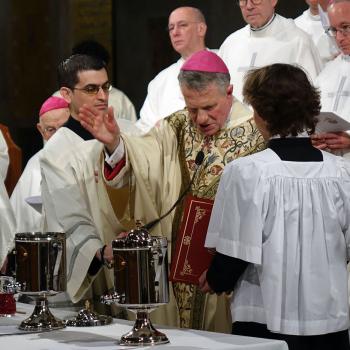I have not been naive for many years now, but this new reading opened my mind to the struggles of individuals as they come to see inconsistencies in the Church, its history, its founder, its scriptures, and its bureaucracy -- as they shed their innocence and replace it with something that is far less comfortable for them and far less comforting. Most of the distress for thoughtful Mormons seems to revolve around Joseph Smith in one way or another. Rightly so. Richard Bushman stuck it in his title where no one could ignore it, but Joseph really was a rough stone. His life was surrounded by controversy because he was controversial -- imperfect and unconventional and incomparable. Neither his fellow Saints nor his enemies could go to the Legacy Theater to see his life portrayed with skillful editing and majestic overtones. They saw him up close and personal, both the grandeur and the blemishes. Still, he himself had it so very right when he said to his followers shortly before his death, "You don't know me." They didn't, and we certainly don't.
Some of the questions that perplex people concern the intersection of knowledge and belief. Is it really possible to know anything for certain in the field of religion? I've read essays by faithful intellectuals, rational arguments they have constructed to support their belief in the Church and their dedication to its teachings. Others try to deflect the question. "The goal of religious development," a social scientist once asserted, "might not be the serenity of certainty, an absolute acceptance on faith, but the capacity to sustain the tension of not knowing. To be able to live with uncertainty, to be able to cope with the insecurities of an exceedingly complex world in order to control it would be a higher achievement religiously, I think." In other words, we should not seek to know with certainty but should embrace our uncertainty.
Another writer reasoned, "It's not too hard for me to translate ‘I know the Church is true' to ‘I know I have had a burning in my bosom which confirms the goodness of the Church and the truth of the principles which it teaches.'" His argument, apparently, is that this inner burning doesn't really constitute knowledge. So what can one know?
It has been a long, long time since I could say with a straight face that the gospel is simply beautiful and beautifully simple. I've gone the rounds with Correlation more than once over nebulous doctrines and unusable sources. Yes, Joseph Smith restored the fullness of the gospel, but he died before he filled in all the gaps and answered all the questions. Perhaps this was intentional.
Where Pastor Kühne got his information, Elder Callister and I didn't know, but as our Reformed Lutheran nemesis sowed the seeds of doubt, we tried to dig them up before they grew roots and sprouted. At least Elder Callister did. I was brand spankin' new in Germany and was struggling just to follow most conversations. I couldn't have added my two cents worth at that point even if I'd had the correct change.
You see, I wanted to know the truth almost as desperately as Frau Rüster. Almost. I had grown up in a traditional Latter-day Saints home, but I had been more interested in sports and girls than deep religious questions, or even shallow ones. I knew all the Sunday School answers, but I'd never asked any questions -- particularly the one I should have asked -- until I walked through the front door of the Mission Home in Salt Lake City and became quite suddenly a stranger in a strange land. The bar in those days, of course, was much lower. The spiritual atmosphere in the Mission Home and then the LTM (which, I was told, stood for Longest Two Months) was entirely foreign to me. I struggled. I'd had six years of German in school, so the language was easy. But spiritual things were near impossible.
Most of the other elders were sure in their testimonies. They made me feel like a spiritual infant. But some others were in diapers, too -- to a degree. As the weeks passed, however, they would inevitably stand in testimony meetings and tell how they had gone to an empty classroom one night and prayed and received an answer. I tried that too. But my prayers bounced off the ceiling, ricocheted around the room for a few seconds, then faded quickly into an ever-deeper silence. I was so ignorant spiritually I didn't know what a witness of the truth would feel like. If I received one, would I even recognize it?
I prayed incessantly. I pleaded. I probably made promises I knew I couldn't keep. Silence. I read the Book of Mormon through in two and a half weeks. I took Moroni at his word. I asked with a sincere heart and with real intent. Silence.
I did know what the Spirit felt like. We'd met in passing a couple of times, once very impressively during the sacrament meeting where Doug King gave his mission report. But I didn't assume that this encounter constituted a witness. It was a strong feeling, certainly a burning within, but it didn't impart any knowledge to me, other than the rather obvious fact that I wanted to serve a mission and become the kind of person Doug had become. For some reason, I assumed a testimony was more than just a warm feeling. I'd had warm feelings about The Lord of the Rings, Charmian Carr in The Sound of Music, and Grandma's pumpkin chiffon pie. Maybe I was naive. Maybe I wasn't. But even the warm feeling eluded me. I swore I'd never fly off to Germany without a testimony. But I was basically chicken. I didn't want to endure the disgrace of giving up and going home. Eventually, I convinced myself that going to Germany, even without a testimony, was the right thing to do.




